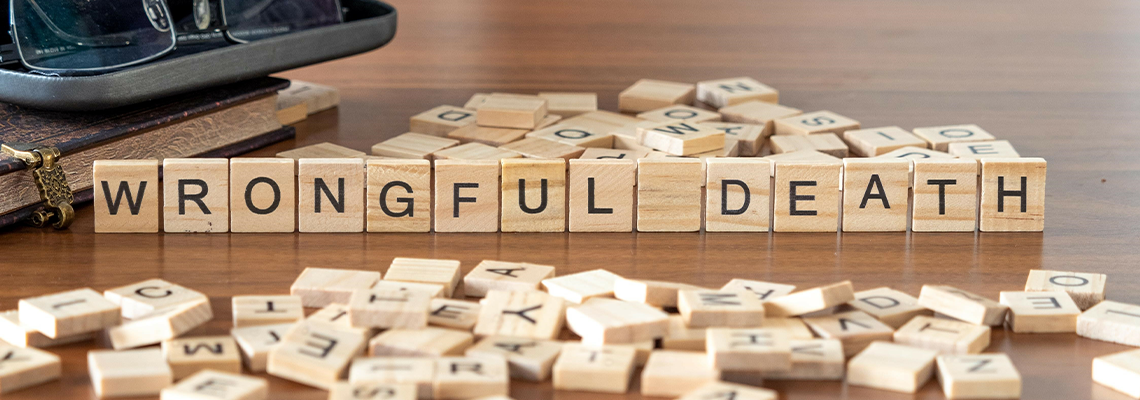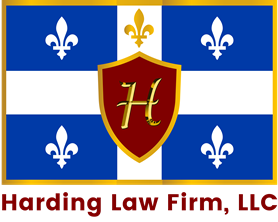Necessary Elements in a Wrongful Death Claim

In the aftermath of a tragedy that results in the loss of a loved one, the word "compensation" may seem jarringly inadequate. Which is completely understandable.
Yet, for many families, a wrongful death claim isn't just a legal process or formality; it's a crucial means of seeking justice and support. In this article, we explore the importance of wrongful death claims and how to position yourself for success should you ever have to file one in the state of Georgia.
If you've recently lost a loved one in an accident, please know that you don't have to take another step alone.
The Harding Law Firm, LLC is here to provide the compassionate, skilled representation you need to seek fair compensation with as little stress as possible. Attorney Todd A. Harding's office is in Griffin, Georgia, and he serves clients throughout Spalding County, Butts County, Monroe County, Lamar County, and Henry County.
Understanding Georgia Wrongful Death Claims
A wrongful death claim arises when one person's negligence, wrongful act, or default results in another person's death.
Under Georgia law, these claims enable the deceased's family or estate to seek monetary damages as a form of recompense for their loss.
The statute of limitations for filing a wrongful death claim in Georgia is generally two years from the date of death (subject to a few exceptions), out of respect for the time-sensitive nature of these legal actions.
Who Can File a Claim?
In Georgia, the following parties have the right to initiate a wrongful death action:
The deceased's surviving spouse
If no spouse survives, the deceased's surviving child or children
If no spouse or children survive, the deceased's parent or parents
If no spouse, children, or parents survive, the administrator or executor of the deceased person's estate
Essential Elements of a Wrongful Death Claim
For a wrongful death claim in Georgia to be successful, the plaintiff needs to prove the at-fault party was indeed at fault for their loved one's death. To successfully do so, you must establish four critical elements.
1. Duty of Care
The first element involves proving that the defendant owed the deceased a duty of care. This duty varies depending on the relationship between the parties and the circumstances of the incident.
For example, drivers have a duty to obey traffic laws to avoid harming others on the road, and manufacturers must produce products that are safe when used as intended.
2. Breach of Duty
Second, it must be shown that the defendant breached that duty through negligence or wrongful actions.
A breach could occur in many ways, such as a driver operating a vehicle under the influence of alcohol or a company failing to recall a product known to be hazardous.
3. Causation
The third element is causation, which requires showing that the defendant's breach of duty directly caused the deceased's death. This means establishing a clear link between the defendant's actions (or lack thereof) and the incident that resulted in death.
Causation can often be the most complex element to prove, as it must be demonstrated that the death would not have occurred if it hadn't been for the defendant's negligence.
For example, causation can be challenging to establish in medical malpractice cases, where the plaintiff must prove that a healthcare provider's actions (or lack thereof) directly resulted in the patient's death.
4. Damages
Lastly, the claim must include quantifiable damages resulting from the wrongful death. These damages can include the loss of earnings the deceased would have contributed to the family, medical and funeral expenses, and non-economic damages such as loss of companionship and emotional distress suffered by the surviving family members.
Successfully proving these four elements in a Georgia wrongful death claim can be challenging, but it's essential for obtaining justice and financial support for your family.
Gathering Evidence and Building a Strong Case
Building a strong case for a wrongful death claim in Georgia necessitates meticulous gathering and analysis of evidence. This process often involves collecting medical records, accident reports, witness statements, and expert testimony to support the claim of negligence or wrongdoing.
The evidence's quality and depth can greatly impact the ability to establish the crucial elements of duty of care, breach of duty, causation, and damages.
You're already going through a lot. Let a legal professional support you through this process. Attorney Todd A. Harding and his team in Griffin, Georgia, are dedicated to conducting thorough investigations to compile the strongest case possible for their clients, aiming to secure the justice and compensation families deserve during such a difficult time.
The Legal Process
For any grieving families approaching a wrongful death case, it's important to know what to expect in the days ahead, so you can be fully prepared for each phase.
Here is a brief overview of the process:
Initial Consultation: The first step involves consulting with a wrongful death attorney to discuss the specifics of your case. This meeting provides an opportunity to understand the legal framework and determine the viability of your claim.
Filing the Claim: Once you decide to proceed, your attorney will prepare and file the necessary legal documents to officially start the wrongful death claim in the appropriate court.
Discovery Phase: Both parties engage in the discovery phase, where information is exchanged through interviews, document requests, and depositions to gather evidence.
Negotiations: Prior to trial, there's often an attempt to settle the case out of court. Your attorney will negotiate with the defendant's insurance company or legal representatives to reach a fair settlement.
Trial: If a settlement isn't reached, the case will go to trial. During the trial, both sides present their evidence and arguments, and a judge or jury makes a final decision on the outcome of the case.
Appeal Process: If either party is dissatisfied with the trial's outcome, they may opt to appeal the decision, which involves a higher court reviewing the trial's proceedings for any legal errors.
Possible Compensation in Wrongful Death Cases
Damages in a wrongful death case encompass a wide spectrum of losses suffered by the survivors and the estate and can be broadly categorized into three types:
Economic Damages
Economic or financial damages are often the most straightforward to calculate. These types of compensation cover the tangible monetary losses that result from the death.
They include lost wages and benefits that the deceased would have earned had they lived, medical bills related to the incident before the death, funeral and burial costs, and any other expenses that can be directly quantified. Estimating lost wages/future earnings requires considering the deceased's age, career, education level, and health at the time of death.
Noneconomic Damages
Noneconomic damages address the more subjective, non-monetary impacts of a wrongful death. This category covers the loss of companionship, emotional anguish, and pain and suffering endured by the survivors.
In the case of children losing a parent, it can also include compensation for the loss of guidance and nurturing they will miss. These damages are inherently challenging to quantify, requiring careful consideration and sometimes expert testimony to determine an appropriate value.
Punitive Damages
Punitive damages are less common in wrongful death cases but can be significant. They are not awarded to compensate the family for their loss but rather to punish the defendant for particularly egregious behavior and to deter similar acts in the future.
For punitive damages to be considered, the defendant’s actions must usually exceed mere negligence, showing willful misconduct, fraud, malice, or a wanton disregard for safety.
Understanding these categories and the types of compensation you may be entitled to is crucial. It's important to work with an attorney well-versed in wrongful death claims in Georgia to ensure that all potential damages are accurately assessed and pursued.
Why You Should Work With an Attorney
Navigating a wrongful death claim without a lawyer is like trying to cross an ocean without a captain. A wrongful death attorney can provide invaluable guidance, rooted in an understanding of local laws and experience in similar cases.
Choosing the right attorney involves evaluating their experience, seeking references, and ensuring their approach aligns with your family's needs—combining skilled legal representation with personal advocacy.
Compassionate Legal Counsel
While no amount of legal action can erase the pain of loss, a robust, well-supported wrongful death claim can offer a path toward closure and financial stability. By seeking the representation of a lawyer, you're taking the meaningful steps to honor the life of your loved one.
The Harding Law Firm, LLC recognizes that every wrongful death claim tells a unique and significant story. Whether you're just beginning to consider your legal options or seeking seasoned guidance on an ongoing claim, Attorney Todd A. Harding is here to provide the support and advocacy your family deserves. He invites you to share your story and seek his empathetic counsel today.

